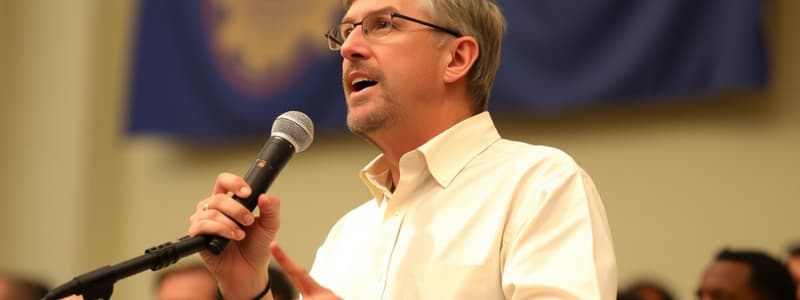Podcast
Questions and Answers
What are two similarities between epideictic and informational speeches?
What are two similarities between epideictic and informational speeches?
- Inform audience about a specific event (correct)
- Provide criteria that created the event (correct)
- Focus on emotional appeal
- Call audience to action
What are two differences between epideictic and informational speeches?
What are two differences between epideictic and informational speeches?
- Focus solely on facts and data
- Encourage critical thinking
- More formal and filled with pathos (correct)
- Establish connection between speaker and audience (correct)
What are two differences between epideictic and persuasive speeches?
What are two differences between epideictic and persuasive speeches?
- Use humor effectively
- Call the audience to action (correct)
- Emphasis on emotion rather than logic (correct)
- Focus on a clear thesis statement
What are two similarities between epideictic and persuasive speeches?
What are two similarities between epideictic and persuasive speeches?
What are three types of epideictic speeches?
What are three types of epideictic speeches?
What is the description of a eulogy speech?
What is the description of a eulogy speech?
What is the description of an awards ceremony speech?
What is the description of an awards ceremony speech?
What is the description of a toast speech?
What is the description of a toast speech?
What are seven strategies for epideictic speeches?
What are seven strategies for epideictic speeches?
What is the specific purpose of epideictic speeches?
What is the specific purpose of epideictic speeches?
What are attention getters in a speech?
What are attention getters in a speech?
What are reinforcement statements in a speech?
What are reinforcement statements in a speech?
What are the main ideas of an epideictic speech?
What are the main ideas of an epideictic speech?
What should the rest of the introduction in an epideictic speech include?
What should the rest of the introduction in an epideictic speech include?
What does the body of an epideictic speech typically consist of?
What does the body of an epideictic speech typically consist of?
What should the conclusion of an epideictic speech include?
What should the conclusion of an epideictic speech include?
What key elements should a eulogy include?
What key elements should a eulogy include?
What are the characteristics of wedding toasts?
What are the characteristics of wedding toasts?
What are the key aspects of acceptance speeches at award ceremonies?
What are the key aspects of acceptance speeches at award ceremonies?
What role do epideictic speeches play in social function?
What role do epideictic speeches play in social function?
Flashcards are hidden until you start studying
Study Notes
Epideictic Speeches Overview
- Epideictic speeches aim to inform the audience about significant events, like graduations, and provide context regarding the criteria that led to these events.
- These speeches establish a connection with the audience through a more formal tone, emphasizing emotional appeal (pathos) rather than pure information.
Differences Between Speech Types
- Epideictic speeches do not call for audience action, focusing on emotions over logical arguments, unlike persuasive speeches that aim to influence action.
- Informational speeches prioritize factual delivery, while epideictic speeches are more emotive and seek to elevate the occasion’s significance.
Types of Epideictic Speeches
- Common types include eulogies, award ceremonies, and toasts/testimonials, each serving a unique purpose in commemorating individuals or events.
Eulogy Characteristics
- Typically prepared, these speeches honor the deceased at funerals, offering comfort through personal anecdotes. Humor may be included if appropriate to the context.
Awards Ceremony Details
- Prepared speeches describe the award and its criteria, withholding the recipient's name until the end. Recipients often express gratitude and share their reflections.
Toast Speech Features
- Toasts are brief (2-3 minutes), often planned but delivered extemporaneously at weddings or dedication ceremonies. They should be light, humorous, and heartfelt, explaining the speaker's connection to the subject.
Testimonials
- Similar to eulogies but for still-living individuals, these speeches honor someone's impact or contributions in a farewell format.
Effective Epideictic Speeches
- Should commemorate objects or ideas succinctly, creating a narrative to convey the occasion's importance while using appropriate language and maintaining brevity.
Purpose of Epideictic Speeches
- The primary objective is to honor and remember individuals or events, aligning with shared social values as emphasized by Aristotle.
Speech Structure Essentials
- Attention getters focus on the event's significance, connecting the audience to shared values and presenting a short narrative.
- The introduction should be brief but impactful, leading clearly into the body of the speech without the need for a preview statement.
Organizing the Speech Body
- The body can be structured chronologically or topically, using stories to illustrate the speech’s main theme and reinforce the emotional connection to the event.
Conclusions in Speeches
- Conclusions provide a transition but do not summarize the body; they may reinforce shared values rather than reiterate specific points.
Eulogy Specifics
- Eulogies aim to evoke desired emotions, focusing on the deceased's values without chronological order. Stories should remain relevant and relatable.
Wedding Toasts
- Brief and topical, wedding toasts should reflect on shared values, concluding with a unified tone, reminiscent of eulogies in emotional delivery.
Award Ceremonies Characteristics
- Short speeches in award ceremonies highlight shared values and the significance of the honor. They can be organized chronologically or topically based on the recipient's life aspects.
Role of Epideictic Speeches
- These speeches play a crucial role in societal functions, reinforcing community bonds and collective memories.
Studying That Suits You
Use AI to generate personalized quizzes and flashcards to suit your learning preferences.

